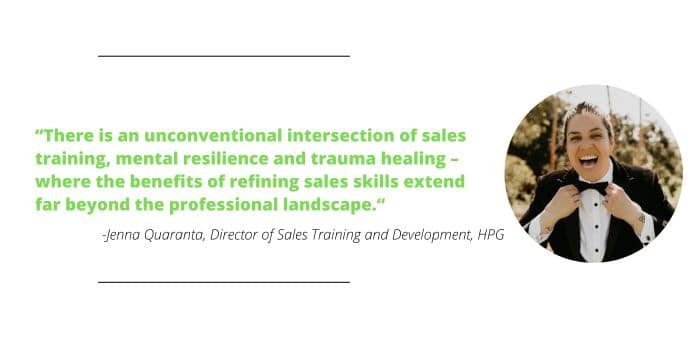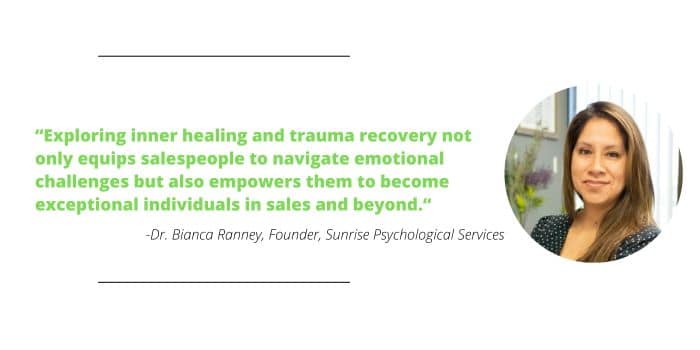(Editor’s Note: PPAI Media’s Voices series introduces the opinions, experience and advice of promo industry influencers. The opinions and ideas belong to the individual writer.)
Salespeople, at the core of their profession, do everything they can to connect with prospects and customers, build trust, forge relationships and stand out as valued advisers. However, the emotional challenges that salespeople often face – fear, frustration, anger, discouragement, etc. – underscore the need for a holistic approach to training that goes beyond traditional sales techniques.
There is an unconventional intersection of sales training, mental resilience and trauma healing – where the benefits of refining sales skills extend far beyond the professional landscape.
I want to spotlight two sales exercises that not only boost mood and confidence but are also valuable tools for trauma healing work. These exercises stand at the crossroads of professional development and personal resilience, offering a unique perspective on the potential of sales training in fostering mental well-being.

Also, I have collaborated with Dr. Bianca Ranney, founder of Sunrise Psychological Services and a trauma therapist in Newport Beach, California, on this article. She’s provided invaluable insights on the intersection of sales training and mental health.
The Positive Affirmation Pitch
In the world of sales, confidence is the linchpin of success. Recognizing this, introducing the positive affirmation pitch exercise in sales training programs provides participants with the dual benefit of mood enhancement and confidence building.
Objective: Boost mood and confidence through positive self-affirmation.
Instructions:
- Participants are tasked with creating a list of positive affirmations tailored to their personal strengths and goals.
- Each participant crafts a short pitch that incorporates these affirmations, infusing creativity and enthusiasm into their delivery.
- The group engages in a supportive exchange, with participants taking turns presenting their positive affirmation pitch.
Trauma Healing Component: Beyond bolstering confidence, this exercise encourages individuals to focus on their strengths and positive attributes. Presenting these positive affirmations helps improve communication skills and builds confidence in expressing oneself – an essential aspect of the healing process.
Dr. Ranney’s Perspective: “Enhancing our communication assertiveness, especially when guided by someone trustworthy and empathetic, significantly contributes to building confidence. Engaging in this process not only fosters self-awareness but also enables healthier interactions with others, making it a valuable confidence boost.”
The Empathy-based Sales Role Play
Sales is about more than just products; it’s about understanding and connecting with others. This exercise, rooted in sales principles, incorporates an empathy-based approach for both skills enhancement and trauma healing.
Objective: Develop active listening and empathy skills while building confidence in interpersonal interactions.
Instructions:
- Participants pair up, with one playing the role of the salesperson and the other the customer facing a challenge or expressing a need.
- The salesperson practices active listening and empathy, proposing a solution or product that addresses the customer’s needs.
- After each round of role play, constructive feedback is encouraged from both participants and observers, with roles and scenarios rotating for multiple rounds.
Trauma Healing Component: By incorporating empathy and active listening, participants not only develop their ability to understand and connect with others but also gain confidence in contributing positively to someone else’s well-being. The supportive feedback reinforces a sense of connection and collaboration – crucial elements in trauma recovery.
Dr. Ranney’s Perspective: “Empathy skills in sales training start with embracing one’s own journey – recognizing past challenges, ongoing growth and aspirations. It’s about extending compassion to oneself, understanding where you’ve been, and nurturing the path to where you want to go.”
Developing Your Emotional Intelligence
Salespeople often face fear, frustration and various emotional responses in their roles. If not addressed, these emotions can hinder their ability to connect with prospects and customers. Recognizing this, the right sales exercises can transform lives.
Navigating the fight response by instilling confidence, addressing the flight response through empathy and understanding, thawing the freeze response with active listening, or soothing the appease response with positive affirmations, exercises can equip salespeople with the emotional intelligence needed for success.
“We should explore the profound impact of sales training, especially in addressing the core needs of professionals to connect with others in their field,” says Dr. Ranney. “Mental resilience and trauma healing involve reconnecting with ourselves.
“Exploring inner healing and trauma recovery not only equips salespeople to navigate emotional challenges but also empowers them to become exceptional individuals in sales and beyond.”

Beyond sales, persuasive speaking, basic negotiation and presentation tactics transcend professional boundaries – they become a set of survival skills. These skills empower individuals to express themselves effectively, understand others and navigate the complexities of communication.
- The ability to persuade and negotiate becomes a powerful tool in resolving conflicts and reaching mutually beneficial agreements.
- Meanwhile, having basic presentation skills equips individuals to articulate ideas with clarity and confidence, fostering a sense of authority and influence.
In a world driven by connections and interactions, these skills serve as a compass for success in various facets of life, reinforcing the notion that sales training is not merely a career development tool but a transformative journey towards mastering the essential art of effective communication.
As sales training evolves into a multidimensional tool for personal and professional development, its impact on mental health and trauma healing becomes increasingly apparent. These adapted exercises offer participants not just a pathway to sales success but a holistic approach to building resilience, fostering positive mindsets and creating connections essential for the journey of healing.
Integrated sales training principles can become a beacon of hope, guiding individuals toward a brighter and more empowered future.
Quaranta is the director of sales training and development at supplier HPG. She made her debut on the PPAI #Online18 list of the industry’s best follows on social media in 2023.


